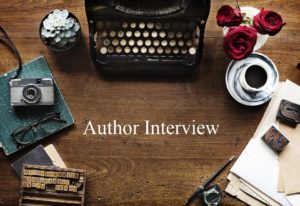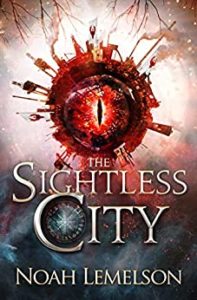An Interview with Noah Lemelson
 Authors love to have their work validated (don’t people in general?) and fellow 2021 Debuts author Noah Lemelson is in the thick of that validation. His debut novel, The Sightless City, released in July, and readers are enjoying it. Screenwriter Gary Goldman wrote, “The Sightless City is like nothing I’ve ever seen. Fantasy, dieselpunk, and sci-fi. Past, present, and future—all at once. Step inside and never leave,” and screenwriter Amanda Silver had this to say about it: “Lemelson builds an intricate steampunk fantasy world and sets it ablaze with haunting characters and deep moral questions. It’s a thrilling debut!” And Goodreads reviewers are throwing in some sharp praise. Tanisha S. said that “This book honestly had me hooked from the start!” while Melina shares, “The Sightless City is a delicious science-fiction martini—dieselpunk and mystery are the gin and vermouth, and Lovecraftian horror is the olive.” What a description! Considering fans are already clamoring for more, I’m sure Noah is hard at work on a second book. As always, I’m grateful he took time out of his busy schedule to answer a few of my questions.
Authors love to have their work validated (don’t people in general?) and fellow 2021 Debuts author Noah Lemelson is in the thick of that validation. His debut novel, The Sightless City, released in July, and readers are enjoying it. Screenwriter Gary Goldman wrote, “The Sightless City is like nothing I’ve ever seen. Fantasy, dieselpunk, and sci-fi. Past, present, and future—all at once. Step inside and never leave,” and screenwriter Amanda Silver had this to say about it: “Lemelson builds an intricate steampunk fantasy world and sets it ablaze with haunting characters and deep moral questions. It’s a thrilling debut!” And Goodreads reviewers are throwing in some sharp praise. Tanisha S. said that “This book honestly had me hooked from the start!” while Melina shares, “The Sightless City is a delicious science-fiction martini—dieselpunk and mystery are the gin and vermouth, and Lovecraftian horror is the olive.” What a description! Considering fans are already clamoring for more, I’m sure Noah is hard at work on a second book. As always, I’m grateful he took time out of his busy schedule to answer a few of my questions.
Christina: The Sightless City is the first in a trilogy of steampunk fantasy. What drew you to that genre over any others?
Noah: I think I wandered into steampunk fantasy as opposed to targeting in on it. In fact the novel ended up being in between genres, some mash of steampunk, dieselpunk, noir, post-apocalypse, and fantasy. I’m a big fan of space operas, but wanted a world that was a little smaller, more controlled. I like ye olde fantasy, and the secondary world therein, but wanted a more technologically advanced setting that plays with more modern ideas and values. This vague turn-of-the-century-punk works as a good middle ground, and mixes surprisingly well with the rusty, deserty, Mad-Max-y feel of the Wastes.
Christina: Publisher’s Weekly wrote of the book, “Stellar worldbuilding and quick pacing. This is sure to entertain any fan of gritty speculative fiction.” What is your process when it comes to worldbuilding? What inspired this world in particular? Did you struggle with bringing any of the world to life?
Noah: It’s definitely a syncretic mix of a lot of works, both novels, films, and games I loved as a kid. I hesitate to explain the influences too much, lest the stitch work becomes visible. But industrial decay as an aesthetic was a big influence. I can’t say why, but I find abandoned spaces and rusty machinery quite beautiful, and I wanted to make a world that reveled in that. On a more character level, each of the major characters allowed me to explore a genre that I loved growing up, while putting my own twist on how they develop. My plan, or hope rather, is for the series to dip into many genres, while still feeling consistent in tone and world.
Christina: You’re also a short story writer. Does your approach to writing short fiction and novels differ? Are there similarities? Which do you find easier to write and why?
Noah: I think I get a free 1,000 words for every project, and the rest comes through with sweat and hard work. So short stories can be easier in that way, but you also have to be more economical with space, which can actually be quite time consuming. It is not uncommon for short stories to keep growing despite best efforts, and the worst note to ever receive as a short story writer is “this should be a novel.” Still, there is a strong lineage of short story writing in this novel. I first experimented with the book by writing each character’s backstory as a short story. I intended to tell these in flashbacks, but that got rather awkward. In fact, this first book is really the combination of Marcel and Sylvaine’s short stories, though much longer. (Particularly Marcel’s, which took up 3/4 of the novel, how greedy!)
Christina: Like you, I “made a hard pivot into the world of fiction” from a science background. Can you tell us a little bit about that decision? How does your degree in science inform your writing?
Noah: I know of some people who can manage to do both, and their time-management skills utterly baffle me. As for my journey, I knew I wanted to commit 100% of myself into either path. I have a deep love for science, particularly biology, and particularly particularly, animal behavior (and particularly particularly particularly primatology). But I realized that loving science is different from doing science. In the end, I realized that writing allowed me to share things about myself that I couldn’t communicate any other way, and that if I wanted to explore that I really needed to commit myself to it. I still love science, and I’m working as a middle school science teacher. I actually feel like I’m trying to answer the same questions with writing as I wanted to with research. Questions about human behavior, our place in the world, and the nature of reality itself. It’s a bit easier to try and answer these questions when your work isn’t peer-reviewed, I’ll admit.
Christina: All authors have a “journey to publication” story. What’s yours?
Noah: Well, I was rejected a lot. A lot a lot. Publication is hard, yo. And it’s not a meritocracy. My first “break” as it were was getting longlisted, then shortlisted, and finally receiving an award (a 1st place award, which oddly is not the highest) at Chanticleer Book Reviews. Did that help my book get published? No idea, though I slapped a mention of it onto every further query letter. It did give me the confidence to persevere, since someone thought my book was maybe sorta half-decent. Finally, I happened upon a mention of Tiny Fox Press, looking for a steampunk novel. I sent it over, and for once actually got a bite! It’s been great working with Tiny Fox, and I really appreciate the support they’ve given to my book.
Christina: In an interview with your publisher, Tiny Fox Press, you said, “I don’t mind being human, though I could use another arm. Three arms seems like a good number of arms.” I’m intrigued by that answer and would love to hear your rationale.
Noah: You ever try and carry glasses of water to a table without some sort of carrying tray? You can carry like 2, maybe 3 glasses. It’s horribly inefficient. Back in our evolutionary past we reached a streamlined two-arm, two-leg system, great for climbing trees or running in the savannah. But now is the age of carrying junk around, and we as a species need to adapt.
Christina: What’s your writing kryptonite?
Noah: Finding the time, as with many passions. Also commas. I’m always worried I’m using commas inconsistently.
Noah can be found in multiple places!
Website: https://www.noahlemelson.com/
Instagram: @eruditegoblin
Twitter: @NLemelson
Facebook: @NoahLemelsonAuthor
Thanks to Noah for agreeing to this interview! If you know of an author who’d like to be featured in an interview (or you are an author who would like to be featured), feel free to leave a comment or email me via my contact page.

